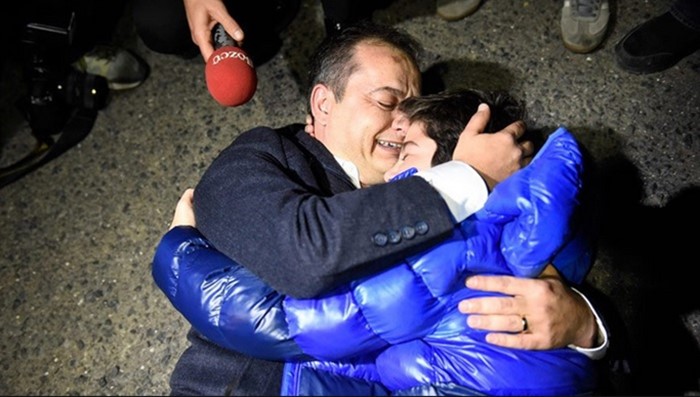Bekir Gökmen Ulu, a reporter for the Sözcü daily, was released pending trial by an İstanbul court after statements were made to the court by pro-government columnists who are staunch supporters of Turkey’s President Recep Tayyip Erdoğan, including Fuat Uğur, Cem Küçük, Ersoy Dede and Hüseyin Gülerce, the Stockholm Center for Freedom (SCF) reported.
According to a report by Bianet, the hearing in a trial of Sözcü staff members was heard at İstanbul’s 37th High Criminal Court on Wednesday. The court heard the statements of Küçük, Uğur, Dede, Gülerce and Anıl Eren Yıldız.
Sözcü news editors Melda Olgun and Yonca Yücekaleli also appeared before the judge.
The court announced its interlocutory decision ordering the release of İzmir-based reporter Ulu with a ban on leaving the country. Sözcü owner Burak Akbay, who is believed to be out of the country, faces up to 30 years in prison on charges of managing an armed terrorist organization and disseminating the propaganda of a terrorist organization.
Meanwhile, the pro-government columnists slammed the indictment of journalists and staff members from the newspaper, testifying at the second hearing in the ongoing trial in which Sözcü personnel are defending against terror charges.
Pro-Erdoğan aTV Europe presenter Uğur, Star daily columnist Dede and Küçük said there was insufficient evidence to link Sözcü and “FETÖ,” a derogatory term coined by ruling Justice and Development Party (AKP) and President Erdoğan to refer to the civic Gülen movement.
Uğur said that while he sometimes argued with Sözcü, there was no way he could say that “FETÖ is behind the publications of the Sözcü daily.” Uğur, who testified as a witness along with Dede and Küçük, said Ulu should not be in prison due to his report on President Erdoğan’s holiday destination prior to an attempted coup in Turkey last July.
“Frankly, I don’t see any evidence in the indictment. I think the indictment is weak and that this case should be closed. I don’t know anything about Sözcü’s links to FETÖ. This case should be closed before more damage is done to the concept of the rule of law,” Uğur reportedly told the court.
Dede also blasted the indictment, saying Sözcü’s alleged links to the Gülen movement, which include claims that the newspaper received money from the movement, are “utter nonsense,” adding that Ulu’s report on Erdoğan’s holiday was within the boundaries of journalistic activities. “It’s shameful to be a witness regarding Gökmen’s report, which constitutes a legitimate journalistic enterprise,” Dede said.
Küçük, meanwhile, described the allegations in the indictment as “extremely funny.” “You can’t say ‘Sözcü cooperated with FETÖ’ based on this indictment,” Küçük said.
An operation was launched into the Sözcü newspaper on May 19, 2016. Detention warrants were issued for Akbay, Olgun, Ulu and Yücekaleli as part of the Turkish government’s post-coup witch-hunt targeting alleged members of the Gülen movement. Olgun was released on probation on Sept. 22.
The 73-page indictment, which was prepared by prosecutor Asım Ekren, charges the suspects with managing and armed terrorist organization, propagandizing for an armed terrorist organization and knowingly aiding an armed terrorist organization without being a member of its hierarchical structure. A crossword puzzle dated Jan. 1, 2016 has also been included in the indictment as the reason for the investigation.
Ekren has also presented a news report by Ulu with the headline “Sözcü found Erdoğan” published on July 15, 2016 as “evidence” and claimed that “the article facilitated the execution of the crime [military coup].”
Turkey is the biggest jailer of journalists in the world. The most recent figures documented by SCF show that 256 journalists and media workers were in jail as of Nov. 7, 2017, most in pre-trial detention. Of those in Turkish prisons, 231 are under arrested pending trial, while only 25 journalists have been convicted and are serving time. Detention warrants are outstanding for 135 journalists who live in exile or remain at large in Turkey.
Detaining tens of thousands of people over alleged links to the Gülen movement, the government also closed down more than 180 media outlets after the coup attempt.
